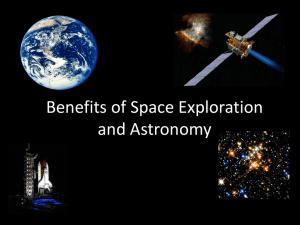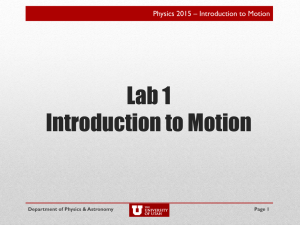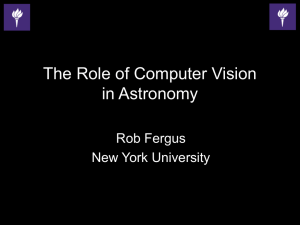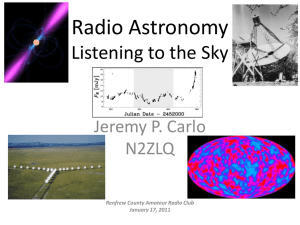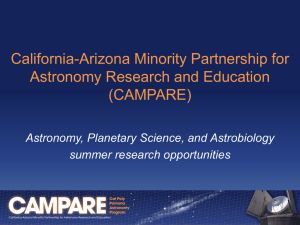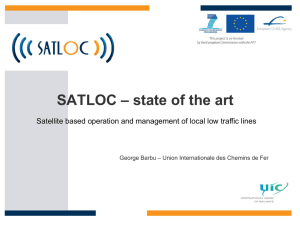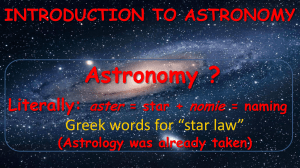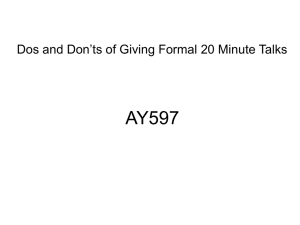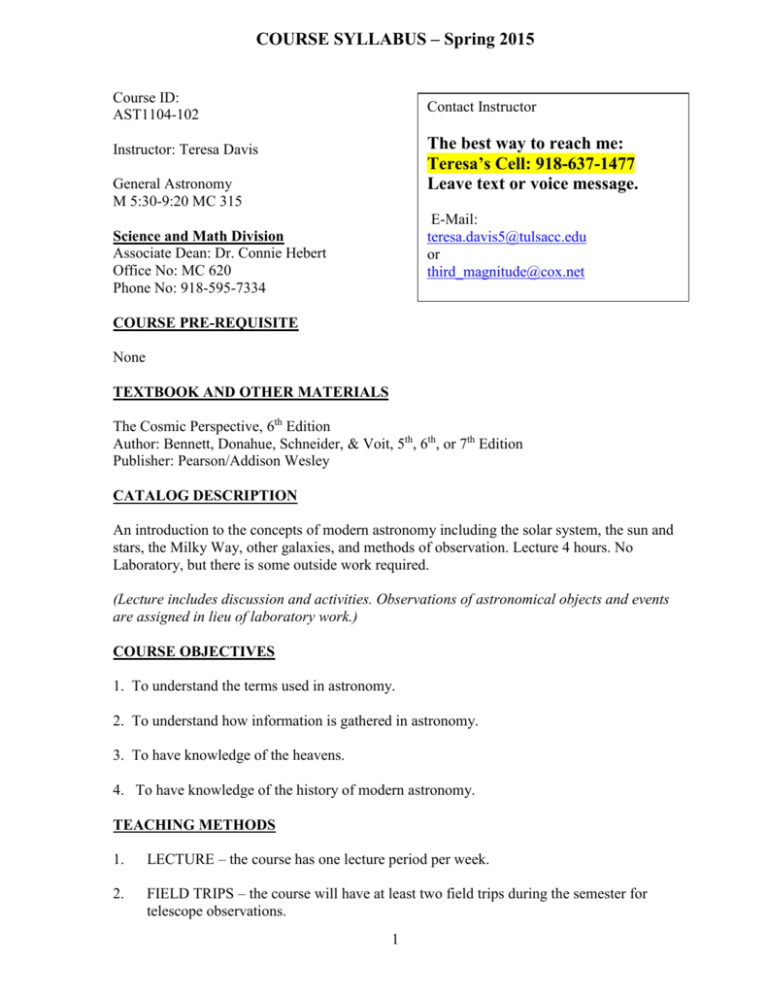
COURSE SYLLABUS – Spring 2015
Course ID:
AST1104-102
Contact Instructor
The best way to reach me:
Teresa’s Cell: 918-637-1477
Leave text or voice message.
Instructor: Teresa Davis
General Astronomy
M 5:30-9:20 MC 315
E-Mail:
teresa.davis5@tulsacc.edu
or
third_magnitude@cox.net
Science and Math Division
Associate Dean: Dr. Connie Hebert
Office No: MC 620
Phone No: 918-595-7334
COURSE PRE-REQUISITE
None
TEXTBOOK AND OTHER MATERIALS
The Cosmic Perspective, 6th Edition
Author: Bennett, Donahue, Schneider, & Voit, 5th, 6th, or 7th Edition
Publisher: Pearson/Addison Wesley
CATALOG DESCRIPTION
An introduction to the concepts of modern astronomy including the solar system, the sun and
stars, the Milky Way, other galaxies, and methods of observation. Lecture 4 hours. No
Laboratory, but there is some outside work required.
(Lecture includes discussion and activities. Observations of astronomical objects and events
are assigned in lieu of laboratory work.)
COURSE OBJECTIVES
1. To understand the terms used in astronomy.
2. To understand how information is gathered in astronomy.
3. To have knowledge of the heavens.
4. To have knowledge of the history of modern astronomy.
TEACHING METHODS
1.
LECTURE – the course has one lecture period per week.
2.
FIELD TRIPS – the course will have at least two field trips during the semester for
telescope observations.
1
EVALUATION TECHNIQUES
There will be five tests, 5 observing projects including an observing log, and 10 quizzes.
Five one hour exams
@ 100 points each = 500 points
4 prescribed observing projects @ 10 points each = 40 points
1 Observing Log
@ 20 points
= 20 points
10 Blackboard Quizzes
(12 quizzes available
@ 10 points = 100 points
do all for bonus opportunity)
Total points = 660 points
See page 4 for other ways to earn points.
GRADING SYSTEM
The final grade will be computed from the following scale:
89.5% - 100%
79.5% - 89.4%
64.5% - 79.4 %
49.5% - 64.5%
=
=
=
=
A
B
C
D
590
524
425
326
-
660 points =
589 points =
523 points =
424 points =
A
B
C
D
LATE ASSIGNMENTS AND MAKE-UP TEST POLICY
You must make arrangements with the instructor.
PLAGIARISM POLICY
Plagiarism is claiming, indication, or implying that the ideas, sentences, or words of another
writer are your own; it includes having another writer do work claimed to be your own,
copying the work of another and presenting it as your own. The student should review the
relevant sections of the TCC student code of conduct policy handbook.
2
TENTATIVE AGENDA
SESSION
Chapter & Subject
1
2
Introduction, and Chapter 1 – Our Place in the Universe
2 – Discovering the Universe for Yourself
3 – The Science of Astronomy
3
4–5
TEST I and begin Ch. 4
4 – Making Sense of the Universe: Understanding
Motion, Energy, and Gravity
5 – Light and Matter
6 – Telescopes: Portals of Discovery
6
7-9
TEST II then Chapter 7
7 – Our Planetary System
8 – Formation of the Solar System
9 – Planetary Geology: Earth and the
Other Terrestrial Worlds
10 – Planetary Atmospheres: Earth and the
Other Terrestrial Worlds
11 – Jovian Planet Systems
12 – Asteroids, Comets, and Dwarf Planets:
Their, Nature, Orbits, and Impacts
13 – Other Planetary Systems: The New Science of
Distant Worlds
10
11-12
TEST III then Chapter 14
14 – Our Star
15 – Surveying the Stars
16 – Star Birth
17 – Star Stuff
18 – The Bizarre Stellar Graveyard
13
14-15
TEST IV then Chapter 19
19 – Our Galaxy
20 – Galaxies and the Foundation of
Modern Cosmology
21 – Galaxy Evolution
Supplemental chapters:
22 – Dark Matter, Dark Energy,
and the Fate of the Universe
23 – The Beginning of Time
24 – Life in the Universe
16
TEST V
3
OTHER WAYS TO EARN POINTS: (May not exceed 200 total points)
Term Paper: Topics must be approved by the instructor and must concern a topic
covered in this course. Paper must be typed, have at least 5 pages of text and 3
sources. Grading criteria will include effort (length, resources, coverage), mechanics
(footnotes, bibliography, grammar, spelling), eye appeal (diagrams and Illustrations).
35 points max
Presentation of term paper: Must be between 5 and 10 minutes and have at least
two visual aids. 10 points max
Activities: One page (or more) report/critique of each activity is required (typewritten
if possible). Examples include; Science museums, planetariums, and observations
with the Astronomy Club (logs required) or track positions of the moon or planets
over a month’s time. 10-30 points
Attend Astronomy Club Meeting: One page report required. 10 points max per
meeting
Subscriptions: Subscription to Astronomy or Sky and Telescope Magazine. 10
points
Astronomy TV program review. 5 points max
Book Review (clear book in advance) 20 points max
Newspaper articles/Web articles: 1 point each (max of 5 points)
Journal Articles: Review articles in Sky and Telescope, Astronomy, Omni,
Discover, Smithsonian, Scientific American, Science, etc. 2 points (max of 10 points)
Join Astronomy Club: 15 points
Misc. Projects: Write a science fiction story or analyze the astronomy in one. Write a
poem or a song, or create an Astronomy inspired recipe. 0-20 points
All Bonus Point works above must be submitted in a notebook or
some form of binding, with an index and your estimate of the points
each assignment should receive. Overall Neatness and Organization
of Bonus Point Assignments will receive an additional 25 points Max.
Total bonus points may not exceed 200 points!
4
The following are events hosted by the Astronomy Club of Tulsa.
All of the following events are open for visitors. The club requests a $2 donation for each event.
Additional events designated as Members Nights are reserved for members of the club. For
information on joining at the discounted student rate visit the website for the Astronomy Club of
Tulsa: www.astrotulsa.com
What:
Date:
Where:
Public Star Party
Saturday, January 24, 2015
General Meeting
Friday, February 6, 2015
Sidewalk Astronomy
Saturday, February 7, 2015
ACT
Observatory
Jenks
Planetarium
Bass Pro in BA
Time:
7:00pm
(sunset 5:42pm)
7:00pm
6:00pm
(sunset 5:57pm)
Public Star Party
Sidewalk Astronomy
Saturday, February 28, 2015 ACT
Observatory
Friday, March 6, 2015
Jenks
Planetarium
Saturday, March 7, 2015
Bass Pro in BA
Saturday, March 28, 2015
ACT
Observatory
Friday, April 3, 2015
Jenks
Planetarium
Saturday, April 4, 2015
Bass Pro in BA
Public Star Party
Saturday, April 25, 2015
General Meeting
Sidewalk Astronomy
Public Star Party
General Meeting
General Meeting
Friday, May 1, 2015
Sidewalk Astronomy
Saturday, May 2, 2015
Public Star Party
Saturday, May 23, 2015
ACT
Observatory
Jenks
Planetarium
Bass Pro in BA
ACT
Observatory
7:00pm
(sunset 6:28pm)
7:00pm
6:30pm
7:30pm
(Sunset 7:45pm)
7:00pm
7:00pm
(sunset 7:45pm)
8:00pm
(sunset 8:06pm)
7:00pm
7:30pm
(sunset 8:12pm)
8:15pm
(sunset 8:29)
Star Party Location: ACT Observatory: Hwy 75 South to 241st. Turn West (Right if
coming from Tulsa). go approximately 2.5 to 3 miles before you stop at Alternate 75, but
you will keep going another 3.5 miles when the road starts winding up the hill. You may
think you are getting lost, but keep going. The road will eventually turn into asphalt again as
it winds to the north. Stay on this part of the road for about 1.5 miles. This road will take you
all the way to the observatory.
5
Basic information for all TCC classes including this
General Astronomy course:
Course Withdrawal:
The deadline to withdraw from a course shall not exceed 3/4 the duration of any class.
Check the TCC Academic Calendar for the deadline that applies to the course(s).
Begin the process with a discussion with the faculty member assigned to the course.
Contact the Advisement Office at any TCC campus to initiate withdrawal from a
course ('W' grade) or to change from Credit to Audit. Withdrawal and/or change to an
audit from a course after the drop/add period can alter the financial aid award for the
current and future semesters. Students may receive an outstanding bill from TCC if
the recalculation leaves a balance due to TCC. Students who stop participating in the
course and fail to withdraw may receive a course grade of “F,” which may have
financial aid consequences for the student.
Communications:
a. Email communications: All TCC students receive a designated “MyTCC” email
address (ex: jane.doe@mail.tulsacc.edu). All communications to you about
TCC and course assignments will be sent to your MyTCC email address; and you
must use MyTCC email to send email to, and receive email from, the instructor
regarding this course.
b. Inclement Weather: TCC rarely closes. If extreme weather conditions or
emergency situations arise, TCC always gives cancellation notices to radio and
television stations. This information is also posted on the TCC website
(www.tulsacc.edu).
General Education Goals: General Education courses at TCC ensure that our graduates
gain skills, knowledge, and abilities that comprise a common foundation for their higher
education and a backdrop for their work and personal lives. TCC’s General Education
goals are: Critical Thinking, Effective Communication, Engaged Learning, and
Technological Proficiency.
Classroom Etiquette: Open and mutually respectful communication of varied opinions,
beliefs, and perspectives during classroom or online discussion encourages the free
exchange of ideas that is essential to higher learning and to the ability to learn from each
other. Use of any electronic device is at the discretion of the instructor.
Syllabus Changes: Occasionally, changes to the syllabus may be necessary. Students
will be notified of any changes to the syllabus in writing.
DISABILITY RESOURCES: It is the policy and practice of Tulsa Community College
to create inclusive learning environments. Accommodations for qualifying students in
compliance with the Americans with Disabilities Act (ADA) and Section 504 of the
Rehabilitation Act are available. To request accommodations, contact the Education
Access Center (EAC) at eac@tulsacc.edu or call (918) 595-7115 (Voice). Deaf and hard
of hearing students may text (918) 809-1864.
6
Academic Dishonesty: Academic dishonesty (cheating) is defined as the deception of
others about one’s own work or about the work of another. Academic dishonesty or
misconduct is not condoned or tolerated at campuses within the Tulsa Community
College system. Tulsa Community College adopts a policy delegating certain forms of
authority for disciplinary action to the faculty. Such disciplinary actions delegated to the
faculty include, but are not limited to, the dismissal of disrespectful or disorderly students
from classes. In the case of academic dishonesty a faculty member may:
require the student to redo an assignment or test, or require the student to complete a
substitute assignment or test;
Record a "zero" for the assignment or test in question;
Recommend to the student that the student withdraw from the class, or
administratively withdraw the student from the class;
Record a grade of "F" for the student at the end of the semester.
Faculty may request that disciplinary action be taken against a student at the
administrative level by submitting such request to the Dean of Student Services.
Institutional Statement: Each student is responsible for being aware of the information
contained in the TCC Catalog, the TCC Student Policies & Resources Handbook, and
semester information listed in the class schedule. All information may be viewed on the
TCC website: www.tulsacc.edu
7

